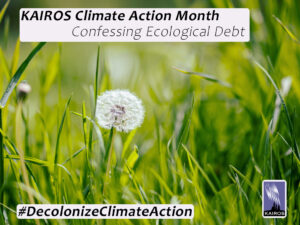Confessing our Ecological Debt in the Season of Creation

Giraffes tell me the Creator has a sense of humour. Hovering hummingbirds fascinate me with their tiny tongues slurping deep in the bowels of a flower. Wildflowers in all shades of colour grow in every terrestrial ecosystem. Complex ecosystems knit together in ways we only slightly understand. The heavens and earth declare the glory of God!
But it is the dandelion that most awakens my faith and wonder. Bright yellows among green grasses delight my eyes (alas, most North American lawn-maintainers have to learn to see that gorgeous profusion). And so much of the plant is edible – greens, roots, leaves, flowers – everything but the stem and with it children entwine a bundle of dandelion flowers to give to mothers. Still, most people call it a “weed.” And yet, as the flowers turn to puffballs it is a “weed” upon which we make wishes!
In the Season of Creation we often look to the beauty of what God has made. It makes sense also to lament. For creation is not all wonder and beauty. There is pain and predation too. And extinction. I am old enough to recall when monarch butterflies were common. They are now an internationally-listed endangered species with population numbers dropping off dramatically in just a few decades.
Praise and lament are spiritual attitudes. Confession is too.
One challenge of the climate crisis is that those who emit the most emissions are not the ones who face the worst effects of the climate crisis. Climate change is ecologically unequal. A sense of fairness suggests that those who did the most to cause a problem should pay the most to fix the problem. That is the concept of a “fair share.”
Those who have benefitted the most from the resources of all creation are at an “ecological debt” to the rest of creation. Acción Ecológica,a KAIROS partner, defines ecological debt as “the debt accumulated by northern industrial countries towards third world [sic] countries on account of resource plundering and use of environmental space to deposit wastes.” Probably most readers of this blog are in that position. If so, we can (and probably should) confess our indebtedness.
The classic line from Jesus’ most well-known prayer comes to mind: “Forgive us our debts” (Matthew 6:12). Remember though, an apology without action is no real confession at all. Correcting this ecological debt means paying our “fair share.” Climate justice is a daunting challenge.
Way back in 2009, the World Council of Churches released a “Statement on eco-justice and ecological debt.” The statement began by recognizing “the need for a drastic transformation at all levels in life and society in order to end the ecological indebtedness and restore right relationships between peoples and between people and the earth.”
Those right relationships in the entire community of creation are the goal of a faith-full and faithful response. Remember though, an apology without action is no real confession at all. Correcting this ecological debt means paying our “fair share.” This Sunday, as you praise the Creator, lament the problems, and confess – decide also to do something. We hope that Climate Action Month helps us all in those decisions.
By Randy Haluza-Delay, KAIROS’ Ecological Justice Coordinator.



